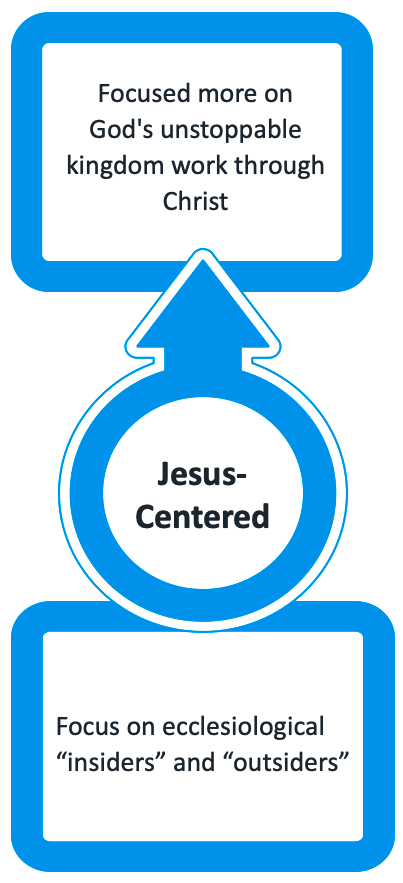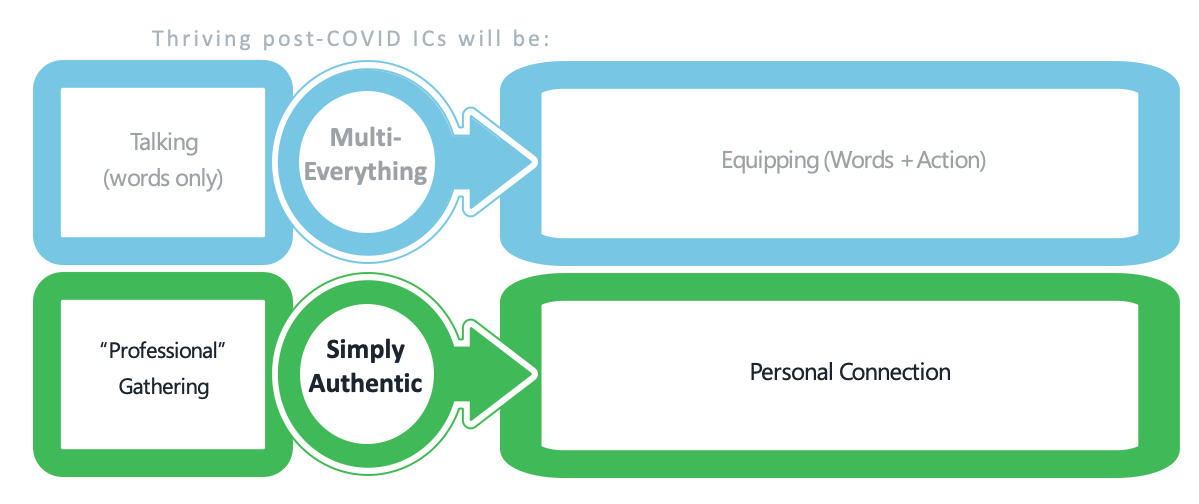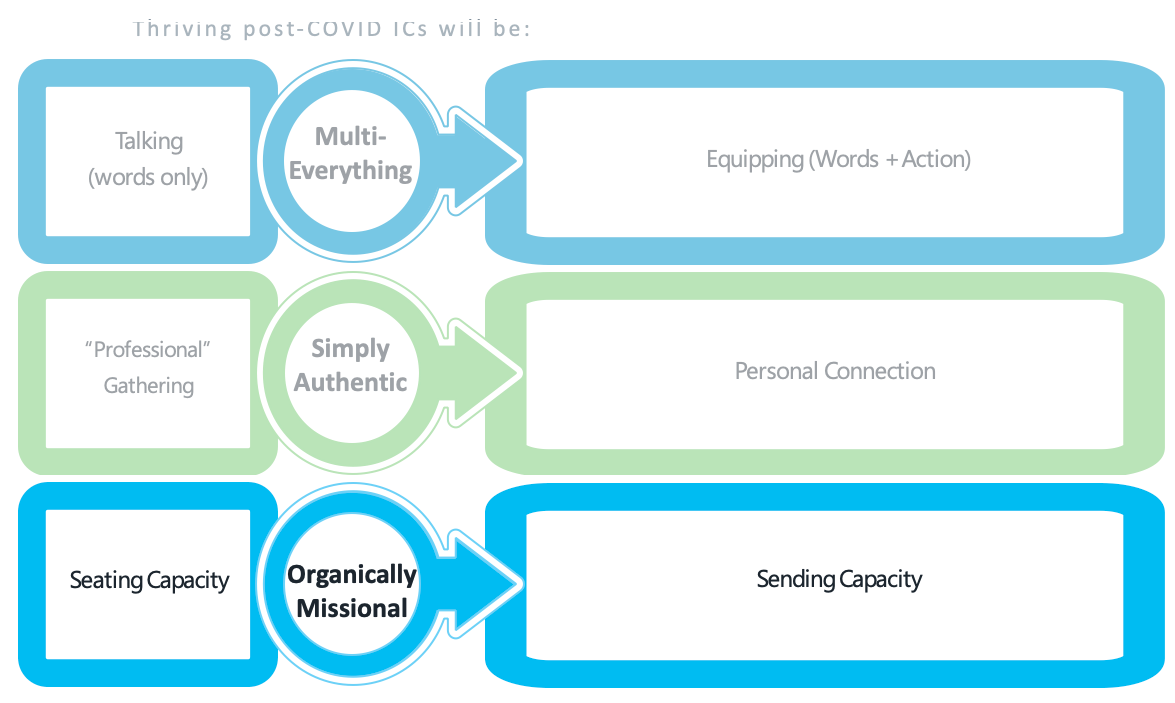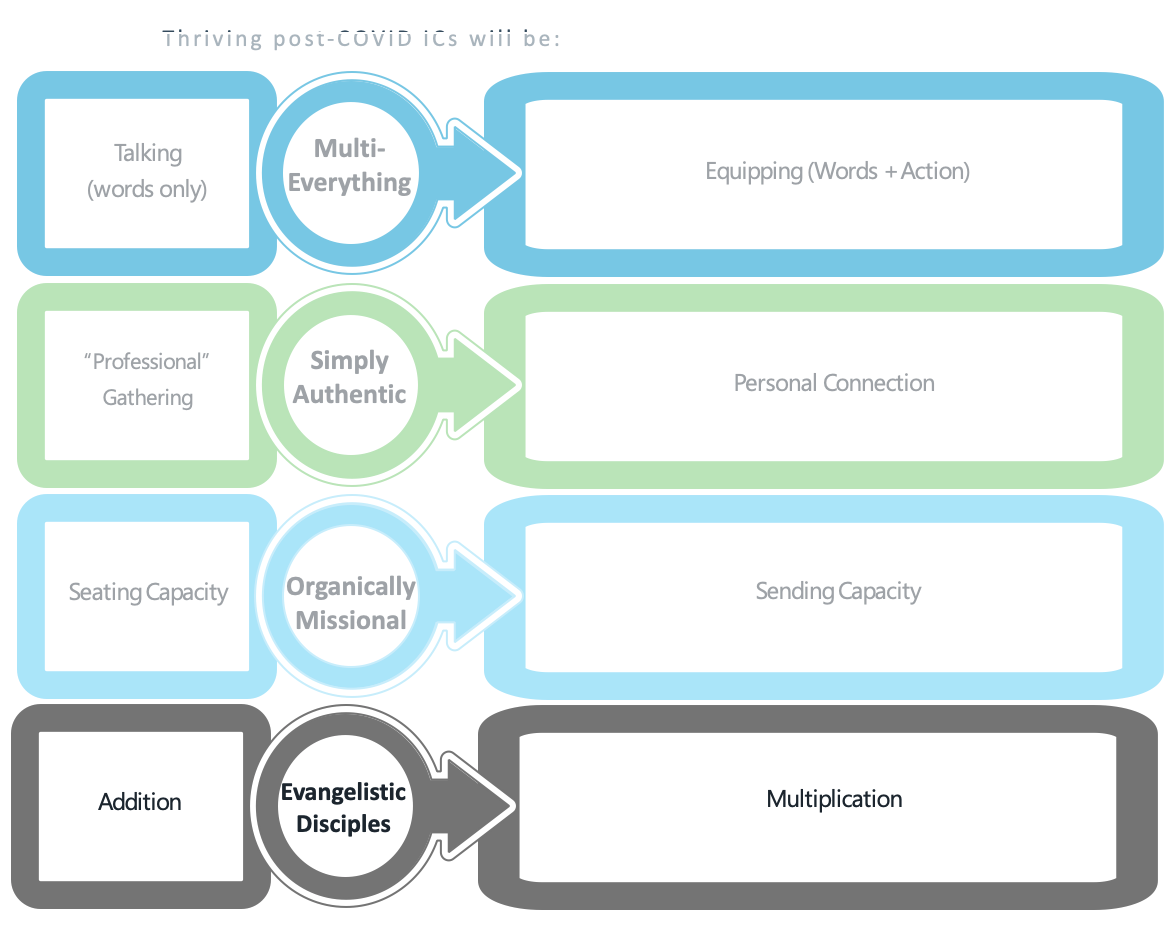Articles like this abound: many leaders are talking about COVID and the trends happening in the church….so what makes this article different? We are going to explore accelerated shifts not just in ministry, but in the International Church (IC). IC’s are unique, and so are IC leaders…It takes one to know one! (In fact MICN wants to support you with resources made by IC pastors, for IC pastors – you’ll want to read all the way to the end of part 2).
If you aren’t familiar with IC’s, MICN has a great write up and you can learn more here (https://micn.org/defined/) Simply put – IC’s around the world primarily serve people of various nationalities (expatriates) and church backgrounds living outside their passport (home) countries. They are also increasingly including more nationals. IC’s many times have greater theological diversity than “home churches” and experience a higher level of turnover due to the transient nature of expatriates. Despite the high turnover of leaders and volunteers, the IC provides a unique sense of “home” to the world wandering diaspora.
Does it sound a bit complex, confusing, diverse, and unpredictable? Welcome to the club! Now add the unknowns of COVID, new and constantly changing guidelines, internet church….it is a perfect disruptive storm for stress… or significant kingdom impact!
This recent disruption has caused a unique innovation opportunity. We can’t miss it. Our task is so much more than just putting church on the internet… we have the blessed privilege and serious responsibility to take the changeless good news of Jesus to a world shaken by change. We get to limp through the battlefield of 2020 and give hurting and broken humanity hope of healing. The deep human need in your part of the world will be thoroughly met by the gospel ministry God has placed you in….
Or we can stress out, panic, deny, or otherwise miss this opportunity.
I’m an optimist, a glass half-full thinker, so here are 5 COVID-accelerated shifts to consider, along with questions to guide a conversation with your leaders:
PART 1: Jesus-Centered – More gospel unity, less “us” vs. “them”

As IC’s around the world have faced COVID, lockdown, quarantine, infections, financial strain, and yes, online church together, we have seen more and more organizations and ministries come together around the gospel than before COVID. Because the IC is more theologically diverse than many churches in our home countries, we in the IC movement have learned to agree to disagree on minor issues and pursue unity around the gospel. MICN has a passion to start and strengthen international church’s, so you can imagine where this is going….
Fewer people seem caught up in bounded-set thinking, upholding tradition, or valuing denominational alliances above all else. There is an increasing focus to make God’s unstoppable kingdom work through Christ primary and not argue as much about denominational standards or tertiary theological preferences. Besides, who wants to argue minor details over zoom?
Questions for Leadership team:
- What are theological “non-negotiables” of our church/ministry?
- What are some secondary or tertiary theological issues that various members of our church ascribe to? How can we promote Jesus-centeredness in the midst of theological diversity?
- Are there churches or ministries in our area with whom we haven’t partnered with recently due to minor theological differences? How can we extend a hand of gospel, Jesus-centered unity to them and work side-by-side?
- What would it take for our church to have the reputation in the area as the unifying church? What can we do to bring Jesus-centered churches together for gospel ministry?
- How can we help our people major on the Gospel and minor in personal opinions when discussing Biblical interpretation?
- How would a random person from our ministry respond when asked by their non-Christian friend “Why do Christians say Jesus brings good news?
PART 2: More multi-everything in action, less talking heads

IC’s are already multi-everything but now more than ever is the time to notice churches that are intentionally diversifying their staff teams. Congregations are going multi-site because of meeting constraints. With the diaspora rapidly on the move, leadership teams are intentionally focusing on becoming more multi-cultural than ever. Churches that had a primary focus on their weekly meetings are finding multiple ways of expressing their vision statement throughout the week. Instead of simply talking about Jesus, or mentioning His kingdom, churches are taking this opportunity to put words into action. The more people use zoom, social media, etc., the more our thinking needs to not be physical or digital, but a multi-platform ministry mindset of what a friend of mine calls “phygital” ministry. Both physical and digital ministry are here to stay.
Questions for leadership to consider:
- How diverse is our community? Our church? Our leadership team?
- Does the diversity of our leadership team match the diversity of the church and community?
- What would it look like for us to meet in multiple locations? What systems and leadership development would we need to have in place? Where could we meet?
- What multi-platform ministry options can we experiment with? (online church, digital discipleship, Love in Action campaigns, etc.)
- How can we engage with people throughout the week in “phygital” ways?
PART 3: Simply Authentic – More people-focused, less professionally-fixated

No matter what stage of lockdown people emerge from, they crave personal connection now more than ever. Yes, people will still want quality ministry like teaching, preaching, and singing….but they want something else deeper. People are tired of consumer-minded online interactions and simply want to be with others and connect. Even when we are allowed to leave our homes, social distancing, masks, regulations, and fear seek to isolate us from one another. People engaging with your church want authenticity more than produced. People more than professionalism. Engagement over Entertainment. Questions answered by God’s Word more than the quality of your music, technology, or meeting space. You don’t need to do ministry like others, you do you. Be yourself – as a leader, as a church. What does your church do well? Do more of that and keep things simple and real. You may need to cut back on the myriad of good efforts to focus on the mighty God ministries He has called you to.
Questions:
1. What ministries are we doing now? (write it all out as a leadership group)
2. What percentage of our resources do we invest in each ministry? (money, energy, communication, volunteers, staff, hours, etc.)
3. Do we try and be something we are not? (How authentic are we? – invite a non-Christian to your ministry and ask them about their honest observations, you may be surprised)
4. How can we increase transparency on our leadership team, church, and in our community?
5. What systems can we put into place to make sure we don’t miss anyone?
PART 4: Organically missional – More sending-capacity, less seating-capacity

As “official” church ministry in buildings came to a grinding halt, many churches were reminded that God works through his church as a people, not a building. This shift is one of the most exciting shifts because the church can equip members to DO ministry, not merely consume ministry. People may be tired of “going to church” or “being religious”, but actively joining God on his mission is the most intoxicating, exciting, and life-altering endeavor. Many churches were already engaged in missional ministry, but imagine how God could use the IC movement as even more churches sent people all over the world. With the high transience we face we get to equip people to take the gospel all over the world. Imagine if we measured church growth by how many multiplying disciples we sent out, instead of how many people were seated in our buildings?
Questions to consider:
- If we asked the average person in church, what would they say are the expectations of them as a follower of Jesus?
- How would you feel and what would you do if we were never allowed to meet in groups larger than 10 forever?
- How do we intentionally equip people to DO ministry instead of sit back and consume?
- How many people do we lose send out every year? How equipped are they to be a disciple who makes disciples?
- What would it look like if we added a zero to the number in question 4? (if you send out 14 people a year to other places in the world, what would it look like to send 140 people out?)
PART 5: Evangelistic Disciples – More multiplication than addition

Everyone wants ministry to have impact, everyone wants to see growth. Chances are that your church will face a people and/or financial challenge in the next 12 months, even sooner if you were struggling with finances before. With (sometimes significantly) decreased resources, how can you do more with less? Multiplication. Instead of thinking “how can we add some people to our church/ministry?” think “How can we empower and equip our people to be disciples who make disciples?” Many times we think about ministry to the masses, but we mustn’t forget that deep work in a few has exponential potential for outreach. People you and I train as leaders have access to people who would never set foot in a church building, yet can hear the news of Jesus from their friends, neighbors, and coworkers. How do we make a culture where multiplication thrives? That’s content for another post, but in the meantime here are some questions to ponder as a leadership team:
Leadership dialogue:
- After reading Matthew 28, how do we define “discipleship”? (Does that definition have multiplication?)
- What is the relationship between evangelism and discipleship? Are the two connected, and if so how?
- How many disciples have we seen multiply outside of the church’s walls in the last 12 months?
- Who in our community are the unreached people (least likely people to come to our ministry)? Who in our church can we invest in deeply to multiply and reach that unreached people group?
- What would a culture of multiplication look like in our church? How can we equip, inspire, and release our people into our hurting community with the good news of Jesus?
Covid has challenged how we think about and do ministry, and things will likely keep changing quickly. What worked before will most likely not work as well post-Covid without tweaking. We can count on two truths moving forward:
1. God does not change
2. Ministry methods do change
With ideas and people connected more now than ever, Innovation is at an all time high. And people are changing quickly as well. Now is the time for you and your leadership team to dream big, take risks, and join God in his amazing kingdom work worldwide.
If you would like help, MICN is here for you. We are more than happy to talk with you about what leading through change may look like in your unique setting. Take a look at these PowerPoint slides that you can use to have a strategic discussion with your leadership team!
Accelerated Shifts Presentation
Would you like to walk talk through some of these shifts with a representative to MICN? We can also set up a time to zoom one on-one at no financial cost to you….Yes, we love starting and strengthening international churches so much, so we will get on zoom for you! Just email michelle@micn.org to set up a time to meet.
May this be a season we see unprecedented kingdom impact for God’s glory.





